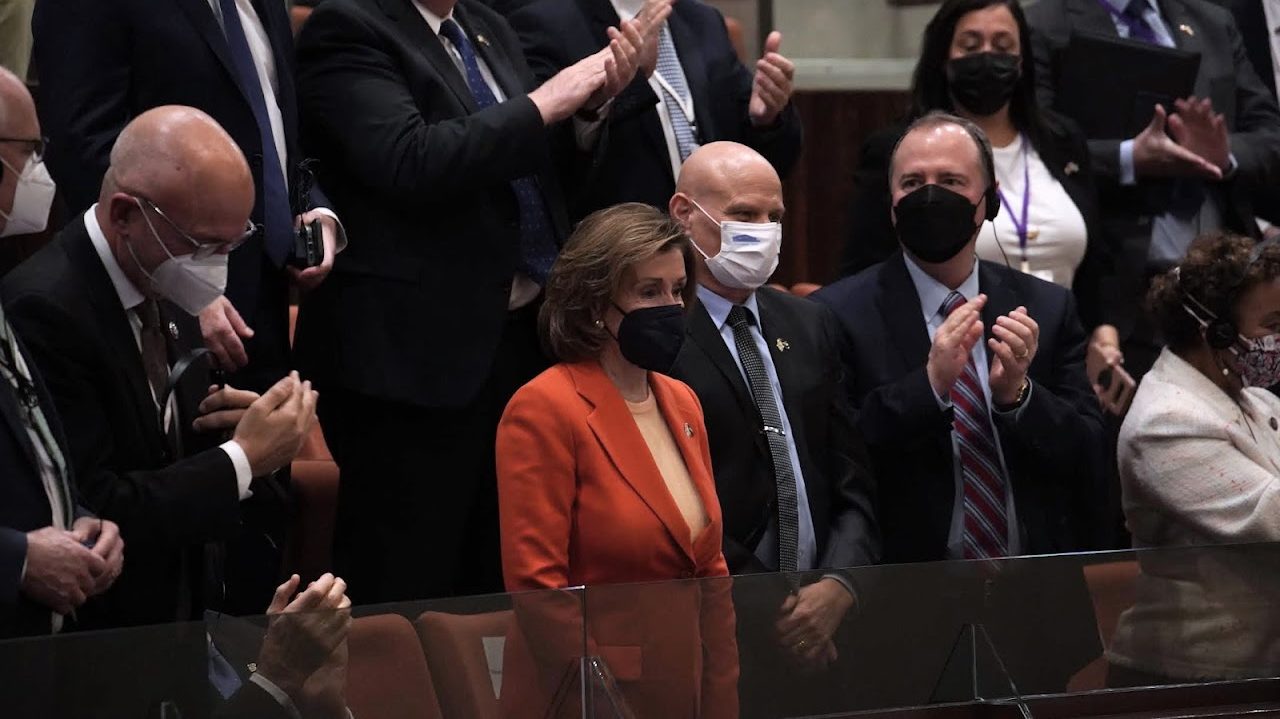Pelosi Manages Expectations Ahead of Iran Nuclear Deal During Israel Visit
Israel and the United States appear to agree to disagree on a new nuclear agreement with Iran, as officials stress “warm ties”
As Speaker of the US House of Representatives Nancy Pelosi continued her visit to Israel Thursday, Israeli government officials went out of their way to demonstrate a warm United States-Israel relationship, a departure from the discord with the previous Netanyahu-led government.
Pelosi led a Democratic congressional delegation to Israel as nuclear negotiations between Iran and the world powers appeared to be heading into their final stages in Vienna. Israel has been carefully monitoring the negotiations, warning of the inadvisability of any deal with Iran.
Pelosi met on Thursday morning with Israeli Prime Minister Naftali Bennett at his office in Jerusalem. According to a statement released by the premier’s office, Bennett “stressed the warm ties between Israel and the US and the importance of bipartisan support for Israel.”
US President Joe Biden has been an avid supporter of renegotiating a deal with Iran, while Bennett has been a vociferous opponent. Bennett and other officials repeatedly have said that Israel is not bound by any agreement that the world powers and Iran will reach.
This could put Israel and the US on a collision course.
“The visit is about managing the disagreement in a way that doesn’t cause an explosion,” said Dr. Jonathan Rynhold, head of the Department of Political Studies at Bar-Ilan University. “The two sides disagree very strongly, so this is an attempt to manage the situation so that it doesn’t do damage to the bilateral relationship.”

US Speaker of the House Nancy Pelosi, left, and Israeli Prime Minister Naftali Bennett meet in Jerusalem on February 17, 2022. (Amos Ben-Gershom/GPO)
Speaking to members of Israel’s parliament, the Knesset, Pelosi said American support for Israel is “iron clad.” Still, under the surface, there are differences between the two governments. Managing relations has also become a balancing act, maneuvering between very different views on key matters.
“Even though the Biden administration is likely inclined to sign an agreement, Pelosi is here to strengthen the position that, despite a possible signing of an agreement, the US still supports Israel in ensuring Iran does not get nuclear weapons,” said Dr. Yonatan Freeman, an international relations expert at the Hebrew University of Jerusalem.
A previous American attempt to stop North Korea from acquiring nuclear weapons in the mid-1990s failed; this has Israel concerned that any promises of a similar contract with Iran may come up empty.
Israel and the US are at odds not only about Iran, but also on the Palestinian issue, even though it currently appears to be side-lined. Like other Middle Eastern countries, Israel is carefully eyeing US foreign policy in the region.
“Israel is less deterred from publicly criticizing US moves,” said Freeman. “At the same time, Israel is more inclined to follow in American footsteps on other issues in order to placate the administration, to project that Israel is not distancing itself from the US.”
Israel has reportedly told the Biden administration it will not oppose the US decision to rejoin the United Nations Educational, Scientific and Cultural Organization (UNESCO). The former administration of President Donald Trump, together with Israel’s Netanyahu government, withdrew from the UN body in protest of what they called anti-Israeli bias.
Israel has remained largely neutral on the current tensions surrounding Ukraine, without voicing outright support for the US. With a vested interest in not angering Russia, Israel appears to back US intelligence assessments in its public statements but has not officially taken sides.
Pelosi also met during her visit to Israel with Israeli President Isaac Herzog, Defense Minister Benny Gantz, and other senior government officials.
“Honored to meet … diverse senior Knesset leaders to reaffirm Congress’ bipartisan support for Israel,” Pelosi tweeted after meeting with her Israeli counterpart, speaker of Israel’s parliament, Mickey Levy.
Though it has been several months since the new Israeli government was sworn in, the memory of the tensions between the previous government and the Democratic Party still exist.
Former Israeli Prime Minister Binyamin Netanyahu went to great lengths to voice his opposition to the previous nuclear deal and the American handling of Iranian nuclear aspirations. In one of the low points of the relationship, if not the lowest, Netanyahu spoke directly to Congress against the deal, circumventing then-President Barack Obama and the White House.
“Both the current administration and the Israeli government would like to avoid a repeat performance,” said Rynhold. “Israel needs to show it is against an agreement, but does not want to ruin relations with the Democratic Party or fight battles it knows it is going to lose.”
According to Moshe Chertoff, vice chair for Media and Policy for Democrats Abroad Israel, relations never really soured between the Democratic Party and Israel.
“Relations at the time were as good as they could have possibly been between a Democratic Party administration in the US and a right-wing government in Israel,” he told The Media Line. “Now that both governments have changed … there is a better feeling of cooperation than there was before.”
Statements released by the US speaker’s office after her meetings with various Israeli officials highlighted Pelosi’s commitment to Israel’s defense and the mutual security interests that exist between the two countries.
The continued American funding for the Iron Dome missile defense system serves as proof of this. During her visit, Pelosi visited an Iron Dome battery set up in central Israel.
“Differences of opinions between friends … should never be interpreted as sides who oppose one another, but rather continuing support … with very specific and certain disagreements that do not hinder the relations whatsoever,” said Chertoff.
Israel is more often than not a contentious issue between Republicans and Democrats. Yet the current administration has more important issues to face. A visit to Israel could play well with some voters, but may not have a large impact on party politics or upcoming mid-term elections.
Such visits “demonstrate the Democratic Party’s interest and care regarding the issues facing our region,” said Chertoff, “They will continue, no matter what polls are showing in the United States.”

Israel’s President Isaac Herzog meets with Speaker of the US House of Representatives Nancy Pelosi at the President’s Residence in Jerusalem on February 16, 2022. (GPO/Amos Ben Gershom)
Within the Democratic Party, the progressive stream has been increasingly vocal against Israel in recent years. The Netanyahu years seemed to have made a dent in what was previously unconditional bipartisan support for Israel.
“There has been talk that the Democratic Party may not be seen as pro-Israel enough,” said Freeman, “This could lead to electoral challenges. The visit is meant to reinforce that the party is pro-Israel.”
Yet the US faces major hurdles, making the subject of Israel less interesting and perhaps less contentious.
“Few Democratic voters vote on Israel, it is certainly not a wedge issue,” said Rynhold. “The challenge posed by the progressives remains, but it is not as powerful as the volume level would indicate.”
Yet this is something Israel will need to monitor closely, as it could easily change.
“As more young voters have more of a say, there will be more progressives in the party,” said Chertoff. “Pelosi has maintained a successful way of minimizing the differences and trying to progress with things important on the Democratic agenda, mainly emerging from the COVID-19 crisis.”
President Biden’s approval ratings have been sliding consistently in the past months and the Democratic Party is having difficulty promoting its legislative goals in Congress. While Israel may not be a key issue among voters, it could sway the vote if the race is tight.
“The Democratic Party needs all the votes it can get,” said Freeman. “Israel could be a game changer if people are less inclined to feel that the US has been less pro-Israel than before.”
The Pelosi visit signals a change in how Israel and the US are now managing differences that come up in the relationship. Throughout the years, the alliance has remained strong despite major friction. While Iran is a source of tension between Washington and Jerusalem, there appears to be an agreement to cordially disagree.


